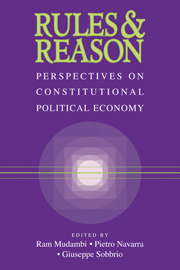Book contents
- Frontmatter
- Contents
- Foreword
- Preface and Acknowledgments
- List of Contributors
- 1 Constitutional Issues in Modern Democracies
- PART I CONSTITUTIONAL THEORY
- 2 On Writing a Constitution
- 3 Constitutional Order and Economic Evolution: Competitive and Protectionist Interests in Democratic Society
- 4 The Efficacy of Arbitrary Rules
- 5 Constitutional Political Economy and Civil Society
- 6 The Constitutional Conflict between Protecting Expectations and Moral Evolution
- 7 Ideological Competition and Institutions: Why “Cultural” Explanations of Development Patterns Are Not Nonsense
- PART II ELECTORAL SYSTEMS AND INSTITUTIONS
- PART III CONSTITUTIONAL ISSUES FOR A FEDERAL STATE
- Index
5 - Constitutional Political Economy and Civil Society
Published online by Cambridge University Press: 05 June 2012
- Frontmatter
- Contents
- Foreword
- Preface and Acknowledgments
- List of Contributors
- 1 Constitutional Issues in Modern Democracies
- PART I CONSTITUTIONAL THEORY
- 2 On Writing a Constitution
- 3 Constitutional Order and Economic Evolution: Competitive and Protectionist Interests in Democratic Society
- 4 The Efficacy of Arbitrary Rules
- 5 Constitutional Political Economy and Civil Society
- 6 The Constitutional Conflict between Protecting Expectations and Moral Evolution
- 7 Ideological Competition and Institutions: Why “Cultural” Explanations of Development Patterns Are Not Nonsense
- PART II ELECTORAL SYSTEMS AND INSTITUTIONS
- PART III CONSTITUTIONAL ISSUES FOR A FEDERAL STATE
- Index
Summary
The Constitutional Premise
A constitution is here defined as a set of rules that determine the political institutions of a society (Mueller, 1996:43). Since a society is defined in terms of the existence of such a set of rules, every society, whether democratic, oligarchic or autocratic, has a constitution.
All societies emerge from some pre-society form that is here called a state of nature, which itself influences the nature and behavior of individuals. In this sense, all constitutions evolve over time and are not to be conceived as rational constructs, even though most scholars of constitutional political economy (Buchanan and Tullock, 1962; Rawls, 1971; Buchanan, 1975; Mueller, 1996) analyze constitutions from a constructivist rationalist perspective, ignoring the evolutionary process.
The importance of evolution is most clearly evident in the example of the United Kingdom, whose unwritten constitution has evolved over more than two millennia. This constitution has been and is being forged by successful and unsuccessful invasions from outside, by bloody civil wars and by the building and then the dismantlement of a great Empire, as well as by a slow, essentially non-violent, post-1688 shift from autocratic monarchy to constitutional monarchy.
The importance of constructivist rationalism is most clearly evident in the case of the United States, whose written constitution, which embraced much of the antecedent English common law, was chosen consciously by a property-owning white male minority elite, was written by design and with purpose and was then imposed upon a largely unen- franchisee! population.
- Type
- Chapter
- Information
- Rules and ReasonPerspectives on Constitutional Political Economy, pp. 69 - 96Publisher: Cambridge University PressPrint publication year: 2001
- 3
- Cited by



